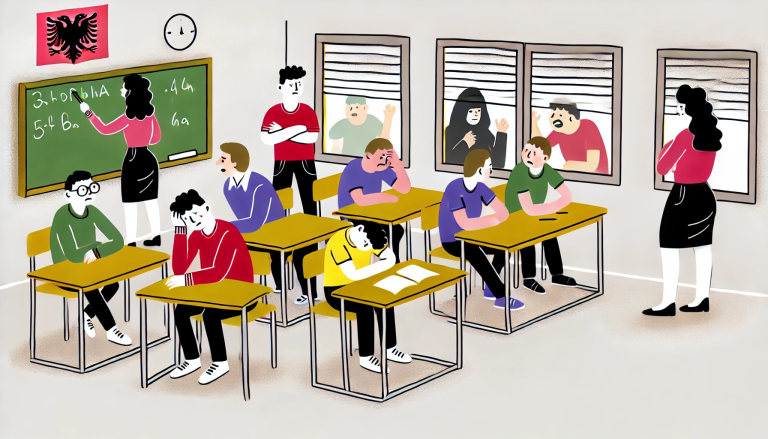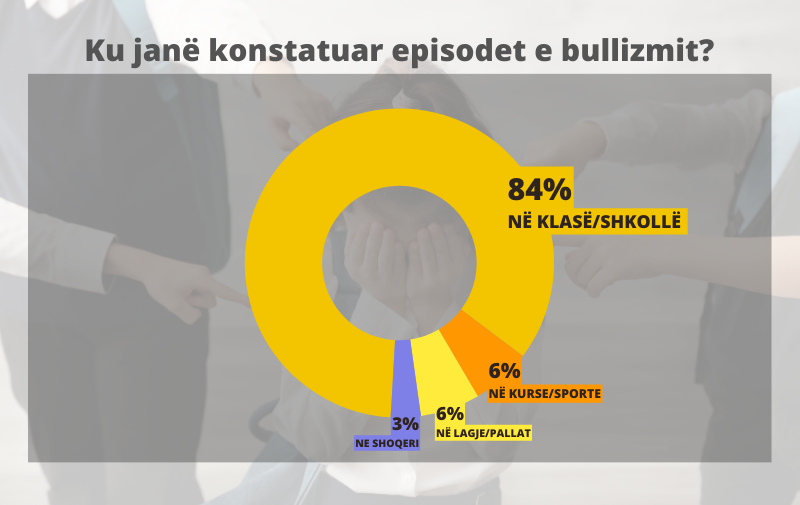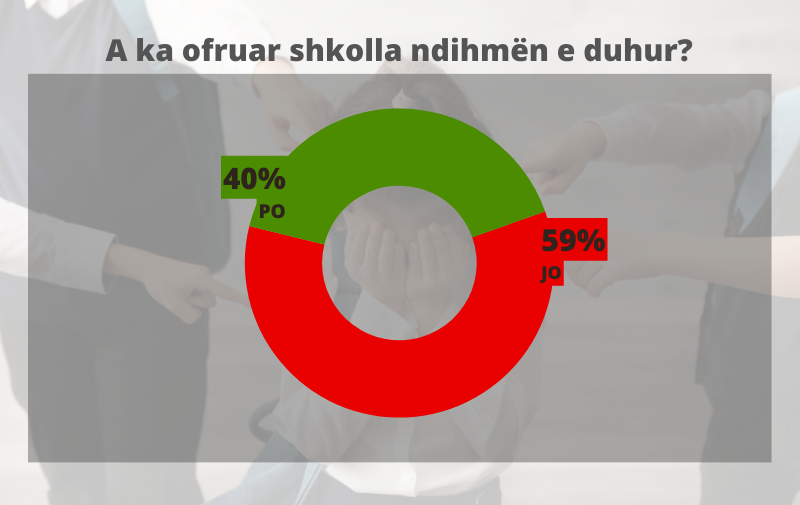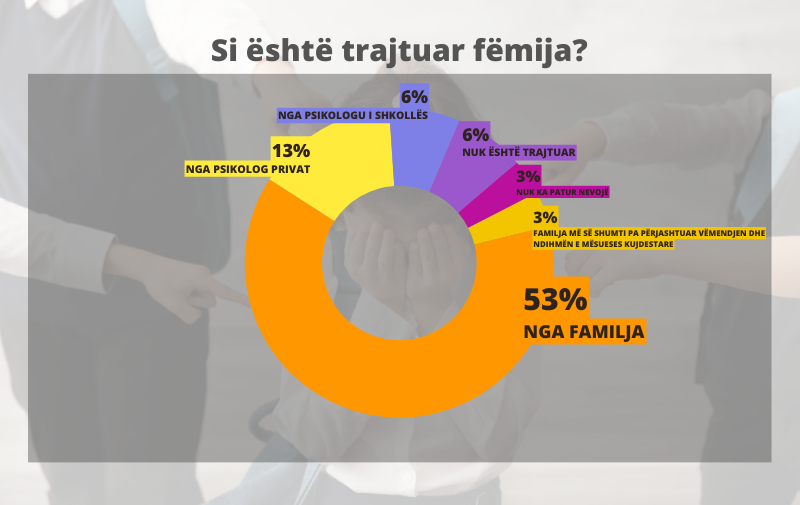
Parents and educators in Albania remain divided over the ability of schools to effectively address frequent instances of bullying among students, while psychologists stress the crucial need for specialized interventions.
Ilda Hoxha
Luljeta, a mother from Berat of a 10-year-old son, has felt deeply troubled for the past two years due to the verbal abuse her son has endured at school.
‘My son would tell me that one of his classmates would say, ‘Today I’m going to break your bones,’ and this continued for a long time,’ Luljeta shared with Faktoje. ‘He even told me he wanted to end his life, and it made me feel desperate too,’ she added, describing the growing sense of hopelessness.
Luljeta revealed that as a result of the bullying, her son became increasingly aggressive and confrontational, highlighting a lack of communication and support from the school’s teachers and psychologists.
The bullying incidents faced by Luljeta’s son are sadly not isolated. Data compiled by Faktoje from an online survey of numerous parents underscores that Albanian schools continue to be environments where verbal and social bullying of children is prevalent.
Many of the surveyed parents, whose children have experienced bullying similar to Luljeta’s son, express frustration over the inadequate support received, while educators and psychologists generally view the responses of educational institutions more positively.
Despite differing viewpoints, there is widespread acknowledgment of the severe impact of bullying on children’s mental health.
‘The consequences of unchecked bullying can be devastating for children, as ongoing emotional abuse contributes to mental health issues, often leading to suicidal thoughts as a perceived way out, especially when these children do not know where to ask for assistance when lacking support and understanding,’ explained psychologist Arjana Muça.
‘In many cases, these children withdraw, experiencing fear, ridicule, and facing their challenges alone,’ she concluded.
Alarming figures
A UNICEF report, ‘Reporting on Violence Against Children in Albania,’ underscores that 60% believe cyberbullying is highly prevalent, while 57% believe bullying in schools is very common.
‘Bullying is perceived as more widespread than other forms of violence against children. Many individuals reported that bullying is common or very common, compared to those who reported that violence against children is common or very common, indicating that many do not perceive bullying as a form of violence against children,’ the report states.
According to a survey organized by Faktoje through the ‘Engaged Community Reporting’ (ECR) app, 84% of parents report that their children face bullying in schools. Parents highlight that verbal abuse and social bullying remain the most prevalent forms, impacting the emotional well-being of their children.

Olta, the mother of a 7-year-old in Tirana, told Faktoje that her son has experienced verbal, social, and even physical bullying. She claimed that the issue begins with the classroom teacher, who also bullies the children.
‘Unfortunately, we have a teacher who discriminates greatly against the children, assigns them derogatory nicknames, and this bullying behavior is then perpetuated by classmates within and outside the classroom,’ Olta said, emphasizing that the teacher only focuses on the children’s shortcomings and never acknowledges their strengths.
‘She consistently highlights only their problems, doesn’t encourage them, and constantly demoralizes them,’ she added.
Psychologists also note that cases of bullying in schools are evident and remain inadequately addressed.
‘The situation in our schools—despite continuous efforts by teachers and psychologists regarding the phenomenon of bullying—remains a somewhat unresolved issue, as bullying cases are a daily occurrence among students,’ said Arjana Muçaj.
‘The bullying statistics are still alarming, affecting both boys and girls,’ Muçaj added, referring to surveys conducted by the Faculty of Social Sciences at the University of Tirana.
Lediona Asabella, a social worker at ‘Besnik Sykja’ high school in Tirana, admitted that despite the efforts made to combat this dangerous phenomenon, bullying remains prevalent in schools.
‘No matter how much effort we put in, we haven’t been able to eliminate it entirely,’ she said.
Teachers on the Frontlines Against Bullying
Blerina Kurti, a teacher at a 9-year-old school in Berat, told Faktoje that when they identify cases of bullying, they address them with the support of the pedagogical staff.
‘We have a staff with 40 years of experience, and with their expertise, they manage issues within the classroom,’ she said. ‘The work is collaborative; psychology is relatively new in its role, but there is daily interaction in classrooms to monitor the situation,’ Kurti added.
Teachers report occasional incidents of bullying in their classes, but these cases are managed by the school.
Xhensila Kokoshi, a teacher in Korçë, emphasized that they have encountered cases of social bullying, which have led victimized students to withdraw from social groups and become isolated.
On the other hand, psychologists stress the importance of continuous communication from teachers to parents regarding their children’s activities.
‘By maintaining regular contact with parents and involving them in school activities, teachers make parents more actively engaged in their parental role towards their child,’ said psychologist Arjana Muçaj.
The Role of Schools
In Faktoje’s survey, where dozens of citizens responded, parents expressed concerns that in 59% of cases, schools did not provide adequate support to children affected by bullying.

‘The role of psychologists in schools should begin with raising awareness among young people about the phenomenon and the consequences stemming from persistent bullying. However, it shouldn’t stop there. They should identify individuals showing antisocial behavior tendencies and address cases by managing problematic behaviors effectively,” suggested psychologist Arjana Muçaj.
Furthermore, she emphasized that good coordination between psychologists and teachers would best aid in identifying and handling problematic cases, as well as contribute to improving parent-child-psychologist communication.
Social worker Lediona Asabella expressed the importance of teamwork in combating this phenomenon
‘The role that teachers and psychosocial services in schools should play is identifying and preventing. When violence and bullying occur, it’s about conflict management, treating the injured, and dealing with the perpetrator,’ she explained.
Clinical psychologist Anori Kroj argued that without the parents’ involvement and mobilization, the psychologist’s work becomes exceedingly difficult.
‘I urge parents to be highly cooperative,’ she said. ‘There are even sessions I conduct with both the child and the parents together,’ Kroj added.
Rising Awareness
In many instances, parents report that they have personally handled bullying cases involving their children. Survey data indicates that in 53% of cases, families have been the primary source of support for these children. However, experts suggest that this may not always be the optimal approach to addressing the issue.

‘When parents understand what is happening with their child, even if they are unsure how to proceed, immediate intervention is needed with the assistance of psychologists, teachers, and other institutions to provide solutions so that the child feels safe and supported,’ said Arjana Muçaj.
Psychologist Joana Paço points out that many children do not report incidents of bullying, and parents themselves often remain closed off.
‘Most children try to hide it or handle it themselves,’ she said. ‘There are also cases where parents tend to let the child manage it alone, without fully grasping the seriousness of the situation,’ she emphasized, noting that awareness has been growing in recent years to seek more specialized help.
Paço added that bullying profoundly affects children’s emotions and behavior, and if left unaddressed, it can lead to long-term emotional and social impacts throughout their development.





